- Home
- Pat Barker
The Women of Troy: A Novel Page 11
The Women of Troy: A Novel Read online
Page 11
“Because he sacrificed their daughter to get a wind for Troy. They were all stuck there waiting, starting to fight among themselves—same as they are now—the whole thing was falling apart…So, he sacrificed her.” She’d been staring into space, but then suddenly she turned and looked straight at me. “I’d kill the bastard, wouldn’t you?”
“She says she’s going to die too.”
“I know what she says.” Her expression softened. “She was always frightened of nets when she was a little girl. We used to put nets over the children’s beds at night to stop insects getting at them, but she’d never let me put one over hers; she always used to scream and pull it down. I gave up in the end. Of course, she got bitten to bits. She was riving at herself all the following day. I just said, ‘Serves you right.’ I actually made her sit down and count the bites—forty-seven, forty-seven—but it didn’t make any difference, she still wasn’t having it.”
Such a mixture of emotions flitting across her face: regret, love, guilt, exasperation…Mothers and daughters have their battles, I knew that—though my own mother had died before I reached the awkward age and I had only happy memories of her. But the impression I was getting from Hecuba was of a really troubled relationship in which nothing had ever been put right.
“I need to see her.”
What could I say? “All right, I’ll do my best.”
The archery contest was well underway now; our conversation was being punctuated by roars and groans from the men outside.
When I left, I was confronted by a solid wall of backs. There was a tense silence as one of the contestants took aim, then a thud as the arrow hit the target, followed by a buzz from the spectators. Peering between the rows of backs, I saw the targets standing in a line and the painted faces of Trojan fighters torn to shreds. So much hatred; you felt it must’ve soaked into the ground beneath our feet.
I turned away and walked on.
15
On my way across the camp, I promised myself I wouldn’t burden Ritsa with my problems, but as I ducked under the flap and stood blinking in the green gloom, I couldn’t help but remember that the last time I’d been here I’d brought Amina with me—and that reawakened the niggling uneasiness that was never very far from my mind. And the tent was not a welcoming place. I still had the sense of being inside a diseased lung that was struggling to breathe, but as soon as I hugged Ritsa and sat down at the bench beside her I started to feel better.
“No maid today?”
“She’s busy,” I said. “And she’s not my maid.”
“Just asking.”
I reached for a pestle and mortar and began grinding some of the herbs she’d laid out in front of her. She made no comment and for a few minutes we worked in silence.
“Actually, I was wondering if I might see Cassandra?”
“I don’t see why not. Perhaps leave it a bit though. She was asleep when I left.”
I looked around the tent. “Bit busier?”
“Huh—silly young idiots tearing chunks out of each other. Fighting over the games—we had one lad in here the other night, his ear had been nearly torn off. ‘Oh, you think this is bad, do you?’ he says. You know, all cocky—‘You should’ve seen him.’ Machaon gave him a right bollocking.”
Poor Alcimus, I thought. So far Automedon had been proved right. Every result was disputed; every friendly contest ended in a fight.
“How is Cassandra?” I asked.
“Oh, you know, up and down. Nights are still bad.”
“No better, then?”
“She is a bit. You can have a conversation now, whereas before…”
“Hecuba wants to see her.”
“Well, of course she does, poor woman, but I’m afraid there’s not much chance of it. Cassandra’s not allowed out of the hut. You know what he’s like.”
“That’s what I thought. And Hecuba’s too weak to walk all the way here…”
“And mightn’t be welcome even if she did. I’ve heard Cassandra say some pretty awful things about her mother. There’s no love lost there.”
We’d been working for perhaps half an hour when there was a commotion at the entrance and two men came in half carrying, half dragging a third man between them. They dumped him unceremoniously on the ground and left. We got up and went to see who it was: Thersites. At first, I thought he’d been beaten up, but then I noticed his eyes were unfocused, or rather, focused on a point only a few inches away from his face; he kept making odd little snatching movements in the air as if trying to catch something only he could see. Drunk? His breath stank, but I didn’t detect wine particularly, or no more than usual.
“Best get him into bed,” Ritsa said. “Let him sleep it off.”
There were several cowhide beds already made up and vacant, so it was largely a matter of dragging him across to the nearest and persuading him to crawl onto it. He was covered from head to foot in what looked like goose shit—god knows where he’d been. “He’ll have to be washed,” Ritsa said. “Machaon’ll go mad if he sees that.” She looked exhausted; she even held on to my arm as she spoke.
“You go and sit down; I’ll do it.”
“Briseis, you can’t.”
I knew what she meant: You’re Lord Alcimus’s wife. It was all very well for a lady to bathe the sick in her own home—that was perfectly right and proper—but to perform the same menial task in a hospital, to choose, actually choose, the work of a slave? It was only what she’d been wanting to say ever since I pulled the pestle and mortar towards me.
“Go on,” I said. “Shoo.”
I fetched a bucket and some rags and set to work, stripping off the stinking tunic and loincloth, rubbing the wet rag in great sweeps across his body. The water in the bucket changed colour rapidly as I worked. Overhead, the canvas flapped and strained, but I was getting used to that; I no longer feared the entire tent was about to take off. Once or twice, Thersites cried out—more, I thought, from the frustration of not being able to catch the invisible objects in front of him than from any real pain. His body was covered in bruises, some purple, some yellow, some blue around the edges with a pale cream centre—taken together they formed a visual record of the last few weeks of Thersites’s life. He kept up a constant gabbling; the few snatches of speech I understood were typical of the man, foul-mouthed, aggressive, obsessed with shit, filth, blood and pus. It was extraordinary how many of his insults involved boils: boils, blains, blebs, wens, pustules, chancres and sores. Where did it come from, I wondered, this preoccupation with diseased skin? But then I rolled him over. One glance at his backside and I wondered no more.
I straightened up and beckoned Ritsa; I wanted to ask her advice about a poultice for after I’d cleaned the boils. Wiping her hands on the sides of her apron, she joined me at the foot of the bed.
“What do you think we should do?” I asked.
Still lying facedown, Thersites twisted round and peered over his shoulder. “Oh, you. Thrown you out, has he?”
I ignored him while Ritsa and I considered how best to bring the boils to a head.
“Oi, you!” Drunken arrogance, spoiling for a fight. “I’m talking to you. Has he thrown you out?”
It was a waste of time getting upset by anything Thersites said. He hated women, especially the young, pretty girls whom the kings reserved for their own use. He particularly resented women like me—the prizes of honour—because we were as far out of his reach as goddesses. Though even with the common women round the cooking fires he must often have found himself elbowed aside by stronger men. I wondered how many of his bruises came from those encounters. But any sympathy I’d ever felt for him was long gone. I added salt to the water and gave his arse a good scrub.
“Ow! Fucking bitch!”
“It’s for your own good.”
“Fucking hurts—and I can’t lie on me back.�
�
“Lie on your belly, then.”
When I came back an hour later, he was curled up on his side, dozing, though he jerked awake when I set the platter down beside him. Ignoring the food, he went straight for the wine, only to spit the first mouthful out. “Is this the best you can do? Virgin’s piss.”
“If you don’t want it, there’s plenty who will.”
He went on grumbling, but eventually settled down to eat. The food was good. Machaon insisted on that.
Machaon himself came in a few minutes later, examined the boils and asked about the snatching movements. “White things,” Thersites said. “Little white things flitting about.”
Machaon turned to Ritsa, reeled off a list of instructions for tackling the boils, then looked down at Thersites. “And no strong wine.”
“Fat chance of that in here. Cows.”
“You keep a civil tongue in your head.”
After a few more instructions about saltwater washes and the various poultices Ritsa might try, he bowed low to me and left. The bow amused me. The first time I met Machaon, I’d been a slave in Agamemnon’s compound, sent to help in the hospital because it was overcrowded, the nurses barely able to cope with each day’s influx of wounded. Within minutes of meeting me—and it had been a warm welcome—Machaon, quite unselfconsciously, had hitched up his tunic and given his balls a good scratch—exactly as he might have done if he’d been alone. Because he was alone. A slave counts for no more than a bed or a chair.
But now, he bowed.
Following Ritsa back to the bench, I thought perhaps it was time I went to see Cassandra.
“Yes, of course,” Ritsa said. “Just let me finish this.” She was working on a kaolin poultice. “You’ll have seen them all soon, the Trojan women.”
I nodded. “Yes, I suppose so.”
“Including Helen.”
“Now who told you that?”
“Oh, one of the girls.”
Ritsa went out of her way to help the common women; her goose-fat jar came in useful after many a rough night, and I’ve no doubt she helped in other ways as well. I’d noticed the hospital kept a very large store of pennyroyal, and there were whole beds of it growing in patches of rough ground behind the huts, though as far as I knew it was of no use whatsoever in the treatment of wounded men, but properly prepared it could end an unwanted pregnancy.
“You don’t approve,” I said. “Me seeing Helen.”
“Not my business.”
I explained about my sister—and then I mentioned Helen’s bruises.
“She’s not your responsibility,” Ritsa said. “Anyway, let him kill her, it’s no more than she deserves.”
Ritsa: the kindest of women, and yet she shared the universal hatred of Helen.
“She was kind to me after my mother died—when I was in Troy and I didn’t have you.”
She nodded, though her mouth remained hard. Neither of us wanted this meeting to end in a pointless argument over Helen, so we chatted, laughed and joked, as she finished making the poultice for Thersites’s backside. “There, that can go in the oven now.” She wiped the kaolin from her hands on the sacking cloth round her waist. “Let him have his sleep out first.”
“What do you think’s wrong with him?”
“Wickedness.”
There was no answering that. We checked to make sure he was still asleep, then I followed Ritsa across the small yard at the side of Agamemnon’s hall. Once, this area would have been full of tethered animals waiting to be slaughtered. Hens, geese, ducks too. I remembered particularly a flock of hens ruled over by a white cockerel with a blood-red comb whose crowing had woken the whole compound every morning an hour before dawn. Now, the chickens were gone, and in their place strutted half a dozen crows, naked eyes glinting as we approached. We were walking rapidly, talking as we went, and yet they scarcely bothered to lift their wings and flap out of the way. Crows were everywhere now, and they seemed so arrogant, so prosperous…Almost as if they were taking over.
Cassandra’s hut was surprisingly large and—as I saw when Ritsa opened the door and ushered me inside—extremely well furnished. Rugs, cushions, lamps—and, on the wall facing the door, a very fine tapestry: Artemis, the Lady of Animals, hunting with dogs. No Cassandra, though. I glanced at Ritsa, who put a finger to her lips and led me along the passage to a room at the end. There, lying fast asleep on the bed, was Cassandra, her unbound hair spread across the pillow, and, lying beside her with his head on her breast, a really rather beautiful young man. My heart thumped with shock, but then I realized this must be her twin brother, Helenus. The man who under torture had betrayed the details of Troy’s internal defences. Helenus was Trojan; he was male—so why was he still alive? Perhaps because his life was part of the bargain he’d struck with Odysseus. That was possible—or perhaps the Greeks just didn’t see him as a man. His betrayal of his father and his city didn’t seem to be weighing heavily on him. He was as deeply asleep as Cassandra, his upper lip making a little popping sound on every exhaled breath.
Ritsa pulled me back. “He’s always here, scrounging for food, but what can you do? I can’t turn him away, he’s her brother.” Back in the living quarters, she said, “Do you want to wait? She shouldn’t be long—they’ve been asleep hours already.”
“I’ll give it half an hour.”
Under the tapestry of vengeful Artemis, we sat quietly. After a while, I noticed that Ritsa had nodded off—she was permanently exhausted, poor woman. My gaze fell on the tapestry again. It told the story of Acteon, whom Artemis changed into a stag when he tried to force himself on her—or, in another version of the story, stumbled upon her accidentally while she was bathing. As the cloth swayed in a draught, Acteon seemed to be fleeing in terror from his own hounds, though there was no hope of escape; he was only a foot away from their slavering jaws. Ritsa was snoring slightly, her head slumped forward onto her chest. I closed my eyes and settled back into my chair. Immediately, behind my closed lids, I saw Cassandra and Helenus entwined on the bed. They looked like lovers; perhaps that’s what I found disturbing—though I suspect few lovers ever achieve that degree of intimacy. All those months before birth, aware, however dimly, of each other’s presence…What a bond that must forge. And yet, as boy and girl, man and woman, the whole trajectory of their lives must have been pulling them apart.
A few minutes later, I heard the front door close and another moment later Cassandra came into the room, blinking and yawning, her hair still tousled from sleep. She took a step back when she saw me, but Ritsa struggled to her feet and introduced us.
“Oh, yes, I know who you are.” Cassandra had curiously bright, hyper-alert eyes and a habit of staring straight at you without blinking. She always seemed to be groping after the meaning of words. This had the odd effect of making her seem stupid, which was certainly not true. At last, after quite a long silence, she went on, “My father told me about you.”
“Priam did?”
“Yes, when he came back to Troy with Hector’s body. He said you’d been very kind.”
Once again, I was touched to think Priam had remembered me. For a moment, I was blinking back tears.
We sat at the table and Ritsa produced bread and some cheese. Cassandra ate very little. She was making small grey pellets with the bread, rolling them between her thumb and forefinger. I noticed she had rather masculine hands: the bones prominent, a network of raised blue veins like drowned worms under the skin. At last she looked up. “So, what brings you here?”
I said I was trying to see all the women who’d arrived in the camp from Troy.
“Oh, you’re the welcoming committee, are you?”
“Not exactly.”
“So, you’ll have seen my mother?”
“Yes, she’s very concerned about you.”
“Bit late for that.”
“She’d like to see you.”
“Not possible, I’m afraid. Nobody’s allowed in, I’m not allowed out…I’m buried alive here.” The silence went on so long, I didn’t think there’d be any more from her, but then she said, “I just want this bloody awful wind to stop.” She put her head in her hands, peering at me through her fingers like a frightened child. “You know what really scares me? They’re going to ask me why they can’t leave, and I won’t know what to say…I don’t know!”
“They won’t ask you—they’ll ask Calchas.”
“Will they?”
I did my best to reassure her, pointing out that Agamemnon had his own priests and seers—of whom Calchas was by far the most important—but I might as well not have spoken. Those unblinking eyes stared straight through me.
“Anyway, isn’t it obvious why the gods are angry?” Ritsa said. “Look at what happened. Temples desecrated, children murdered, women raped…”
Cassandra ignored her.
I said: “Some people say it’s because of what happened to you.”
“What about it?” Hostile now.
“Well, wasn’t that an offence against the gods?”
“It was an offence against me. Anyway, I don’t want to talk about it.”
She went back to making pellets out of bread. But then a minute later it all came bursting out of her. How she’d been walking home from the palace when she’d heard a clash of weapons in the streets and taken refuge in the temple of Athena, hiding behind a huge painted statue of the goddess. How Little Ajax had found her there and dragged her out. How she’d clung to the statue, bringing it crashing to the floor beside her. How all the way through what happened next, she’d stared into the owl-eyes of the goddess, refusing to admit that the body below her neck still belonged to her. I remember I did that, the first few times with Achilles.
“You know the worst thing?” she said. “I was on my period. Made no difference, he just pulled the bloody clout off me and threw it away…I wouldn’t have wanted my own sister to see that.”

 Border Crossing
Border Crossing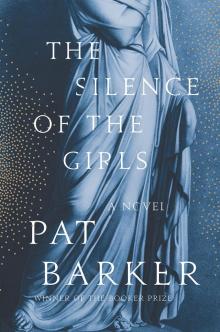 The Silence of the Girls
The Silence of the Girls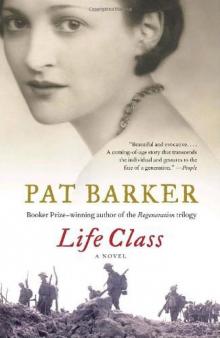 Life Class
Life Class Regeneration
Regeneration Another World
Another World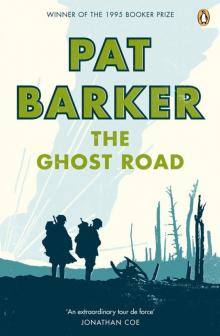 The Ghost Road
The Ghost Road Double Vision
Double Vision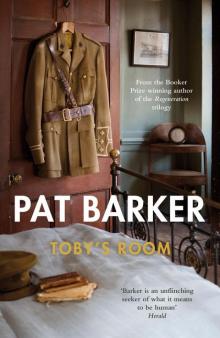 Toby's Room
Toby's Room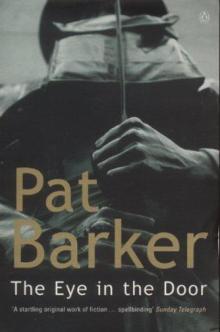 Regeneration Trilogy 02 - The Eye in the Door
Regeneration Trilogy 02 - The Eye in the Door The Eye in the Door
The Eye in the Door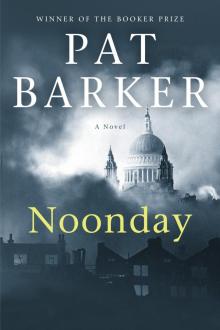 Noonday
Noonday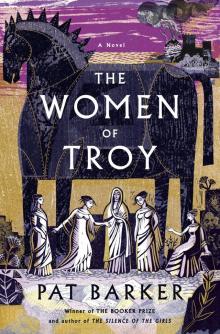 The Women of Troy: A Novel
The Women of Troy: A Novel